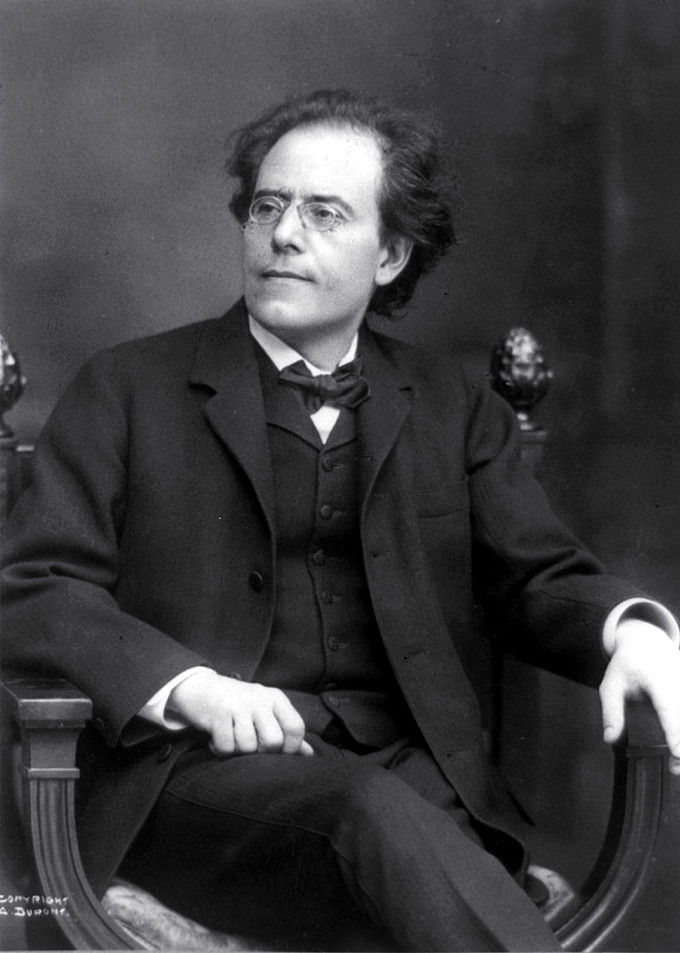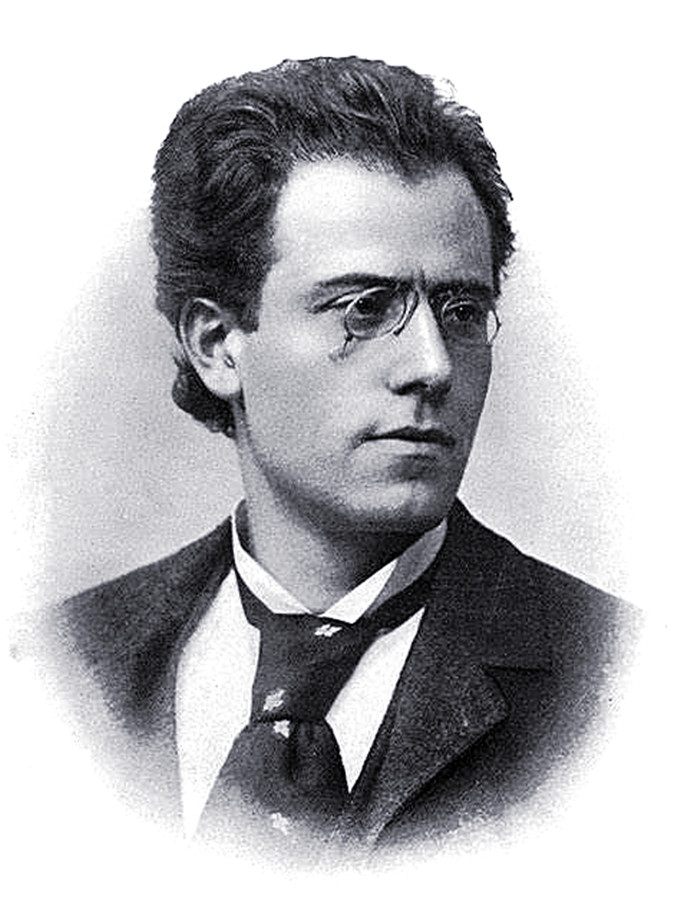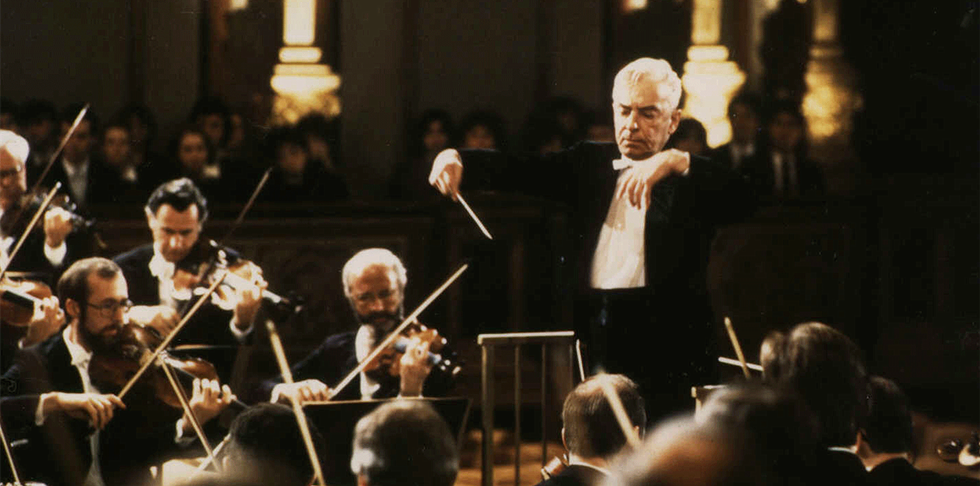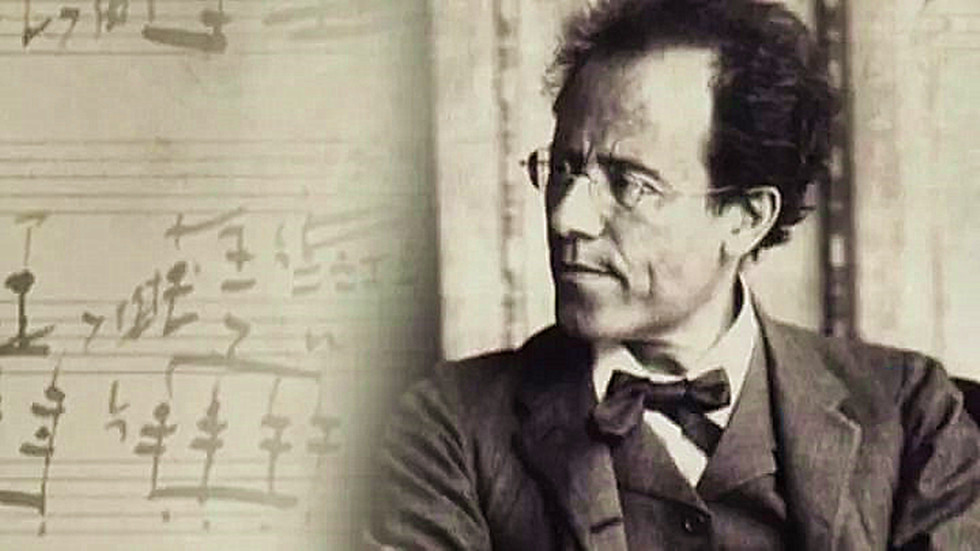| |
|
|
|
|
|
|
|
|
|
|
| |
| |
 |
|
| |
田润德
编译
文/图 2020-01-20 18:36 |
|
| |
|
|
|
|
| |
 |
|
|
|
| |
古斯塔夫·马勒 (Gustav
Mahler,1860—1911) |
|
|
|
| |
|
|
|
|
| |
马勒《大地之歌》Das Lied von der Erde 2011年柏林爱乐大厅 中德文字幕
|
|
|
|
| |
作品语种: 德语歌手: Berliner Philharmoniker,Anne Sofie von Otter,Jonas
Kaufmann,Claudio Abbado 曲名: Das Lied von der Erde,大地之歌流派: 晚期浪漫主义音乐简介补充:
Berliner Philharmoniker Anne Sofie von Otter Jonas Kaufmann Claudio
Abbado |
|
|
|
| |
|
|
|
|
| |
音乐历史上的今天
1888年1月20日,古斯塔夫·马勒一边指挥卡尔·马利亚·冯·韦伯
( Carl Maria vonWeber)的《三个品托》(Die Drei Pin-tos),一边暗地里策划与作曲家的孙媳妇马莉昂私奔。
古斯塔夫·马勒 (Gustav
Mahler,1860年7月7日—1911年5月18日),出生于波希米亚的卡里什特,毕业于维也纳音乐学院,杰出的奥地利作曲家及指挥家,一直崇拜、追随贝多芬。
1885在莱比锡指挥门德尔松的清唱剧《圣·保罗》获得巨大的成功,后被聘为布拉格歌剧院指挥。还曾在莱比锡、布达佩斯、维也纳等地歌剧院任指挥,遂成为当代最伟大的指挥之一,是现代音乐会演出模式的缔造者。代表作有交响乐《巨人》、《复活》和《大地之歌》等等。
《大地之歌》(Das Lied von der
Erde),是交响性套曲,由马勒创作于1908年,1911年由弟子布鲁诺·瓦尔特初演于慕尼黑。作品虽是交响曲,却未排入其交响曲的编号,按照马勒作品的顺序,这部作品应排为“第九交响曲”,而这被马勒认为不吉祥,因为贝多芬、舒伯特、德沃夏克都是在写完自己的第九交响曲后去世的,所以最后定名“大地之歌”。作品采用了汉斯贝特格(hans
bethge)《中国之笛》七首中国唐诗的德文版为歌词,在西洋音乐史上是绝无仅有的。
马勒也没有躲过第九交响曲的魔咒,他把自己的第九交响曲命名为《大地之歌》的马勒,欲瞒天过海,结果还没等大地之歌首演,马勒已经去见贝多芬了。
马勒曾经预言“我的时代将要来临”这句具有悲怆色彩的语言,在他逝世半个世纪后奇迹般的应验了,马勒音乐的崛起成为二十世纪最重要的现象之一。
今日视频:阿巴多指挥柏林爱乐乐团演出马勒的《大地之歌》。 |
|
|
|
| |
 |
|
|
|
| |
古斯塔夫·马勒(Gustav
Mahler) |
|
|
|
| |
Today in music history
On January 20, 1888, gustave mahler took command of Karl maria von weber
"(Carl Maria vonWeber)
Tos), while secretly planning to elope with the composer's granddaughter
ma liang.
Gustav Mahler (July 7, 1860 -- May 18, 1911) was born in carisht,
Bohemia. He graduated from the Vienna conservatory of music.
Conducting Mendelssohn's oratorio st. Paul in leipzig in 1885 was a
great success and was later hired as director of the Prague opera
house.He was also a conductor in the opera houses of leipzig, Budapest,
Vienna and other places, thus becoming one of the greatest conductors of
the modern era and the creator of the modern concert performance
mode.His symphonies include giants, resurrection and songs of the earth.
Das Lied von der Erde (Das Lied von der Erde) is a symphonic suite
composed by mahler in 1908 and first performed by disciple Bruno walter
in Munich in 1911.Works are symphony, but not into the serial number of
the symphony, in accordance with the order of the works of mahler and
this work should rank as the "ninth symphony", which is considered by
mahler not auspicious, for Beethoven, schubert, dvorak is died after
finish his ninth symphony, so the name "the song of the earth".The
German version of Hans bethge's "the Chinese flute" is the first of its
kind in western music history.
Mahler also did not escape the curse of the ninth symphony, he named his
ninth symphony "song of the earth" mahler, to hide the truth, the
results of the song of the earth premiere, mahler had gone to see
Beethoven.
Half a century after his death, mahler's tragic "my time is coming"
prediction has been miraculously fulfilled, and the rise of mahler music
has become one of the most important phenomena of the 20th century.
|
|
|
|
| |
|
|
|
|
| |
 |
|
| |
卡拉扬在指挥马勒的《大地之歌》 |
|
|
|
| |
|
|
|
|
| |
|
|
|
|
| |
马勒 大地之歌 荷兰阿姆斯特丹皇家音乐厅管弦乐团 Fabio Luisi
|
|
|
|
| |
第一乐章:“愁世的饮酒歌”(Das Trinklied vom Jammer der Erde)
奏鸣曲式,双重呈示部,歌词为李白的《悲歌行》。乐章以古诗的歌词为基础,作者将诗分为三段,每段都用“生是黑暗的,死也是黑暗的”作为结尾。这首诗的原意为:人的一生不过百年,面对这一现实,最好的方法是以酒浇愁。音乐以赞美生活开始,以痛苦欲绝告终。第一呈示部的引子悲愤激越,由圆号齐奏、小号助奏出呼叫般激动的动机,然后,男高音独唱主部主题。这是一段难度很高的乐句,表达了作者对人世的愤懑和反抗:第二呈示部基本是第一呈示部的变化重复,由男高音唱第二段歌词。展开部先由加弱音器的小号与英国管交替奏出引子动机,接着小提琴与单簧管构成充满美的幻想与和对生活渴望之情的二重奏。当男高音再次激昂地歌唱时,抒发了一种对有限生命的怀疑与绝望。再现部较短。每唱一次
“生是黑暗的,死也是黑暗的”时,都移高一个调,音乐显得暗淡无光,乐曲在高昂但却有些单薄的旋律声响中结束。
第二乐章:“寒秋孤影”(Der Einsame im Herbst)
奏鸣曲式,双重呈示部,原歌词为钱起《效古秋夜长》(一说唐代张继《枫桥夜泊》 [1]
)。诗句描写了秋日的景象“花儿枯萎,叶落飘零”,它是一首孤独凄凉的情诗。第一呈示部的引子是小提琴奏出的无穷动式的流动旋律,几乎贯穿全乐章。在这平淡得甚至有些呆板的背景上,双簧管奏出那“悲戚的孤独者”的忧郁暗淡、孤单凄凉的主部主题:接着,单簧管奏出副旋律和之,女中音用缓慢的曲调饱含辛酸地倾吐出心中的惆怅,副部主题由第一圆号独奏。第二呈示部基本上是第一呈示部的重复,没有出现“悲戚的孤独者”的主题,而直接用女中音独唱主题的变化重复句。经过短小的展开部,双簧管与歌声交织一起,辛酸、忧伤的旋律,更加重哀怨与痛苦的情绪,催人泪下。最后,双簧管又吹起那“悲戚的孤独者”的主题,音乐回到充满疲惫、怅惘之情的气氛之中。
第三乐章:“青春”(Von der Jugend)
歌词作者署名李太白,原诗是《客中行》 [2]
。这是一首青春的欢快颂歌,是整首交响曲在多灾多难的人生旅途中一首美好的插曲。乐曲的引子是长笛、双簧管演奏的流畅跳跃、轻松活泼的五声音阶旋律,表达了古香古色很有特色的中国情调;接着,男高音轻快潇洒的唱出了以李白诗句为词的清新、喜悦的主题,描写了一群青少年在亭中相聚,欣赏着池中倒映的美景,他们谈笑风生,饮酒赋诗。中段在木管与小号顿奏第一主题后,木管以轻快的顿音与之对奏,由男高音唱出了平稳而豪壮的主题。当小提琴变化重复上面主题时,使人心情特别舒畅,充满青春活力,并对美好幸福的未来寄予希望。但后面的歌声,尤其是弦乐下行大跳的动机反复,给这种希望蒙上了一层灰纱,使之带上虚幻的色彩。再现部较短,那清新的曲调还是那样明快,那些忘却现实的书生们依然吟诗对答,但这只不过是镜花水月而已。
第四乐章:“美女”(Von der Schonheit)
复三部曲式,原诗是李白的一首《采莲曲》。乐曲在长笛平行三度活泼的颤音背景上,由加弱音器的小提琴奏出了柔和的引子动机,小提琴高音区的演奏,表现了一派春光明媚、鸟语花香的景象。长笛吹出五声音阶的旋律,引出了第一部分女中音缠绵、悠闲而甜蜜的歌声,这是一个不紧不慢的五声音阶的旋律,歌中唱到“英俊的少年在岸上绿柳中骑马奔驰”:副旋律是在小提琴分解和弦音型伴奏下的女中音独唱,细腻地刻画了少女的内心世界,使人仿佛看到东方少女的音容笑貌。接着是引子与主旋律的变化重复,描绘了少女、少男们在醉人的风景中相遇的情景。中间部是引子与主旋律的展开,几个器乐段落充分调动了动机发展、转调等手段,还加入曼多林、钢片琴、铃鼓的配器,把“空断肠”的情绪描述得近乎绝望的程度。再现部在主旋律与副旋律间插入了一个展开句,展开句前,小提琴以深沉含蓄的音调再一次表现了采莲女的妩媚与多情。最后,音乐渐渐平静地结束在很不稳定的四六和弦上,使“断肠”之感更加强烈,仿佛痴情少女以若有所失的目光追随着远去的少年,陷入无际的遐想之中。
第五乐章:“春天的醉者”(Der Trunkene im Fruhling)
复三部曲式,原诗为李白的《春日醉起言志》为了体现描写醉酒者姿态的意图,乐曲一开始就由木管乐器奏出满是装饰音的音型,运用了很不稳定的速度与调性,打破了前一乐章结束时的寂静,主题呈示的是一首大自然春意盎然的迷人旋律:紧接着是发展句简单的变化与重复。中间部分得到充分的展开,独奏小提琴一会儿活泼轻快,一会儿抒情抑郁。随后,男高音演唱了坚定有力的“人生如梦”曲调。音乐很好地描绘了在梦幻一般的世界里,借酒消愁者如醉似醒的神态。作曲家把他们对生活的诅咒和希望,全部奇妙地交织在各种旋律、调性和配器之中。同时还以其精湛的配器技巧,使我们感到了微寒的“春风”,嗅到了沁人的“花香”,不时听到几声“流莺”动人的歌唱。再现部中加进一些木管上行、下行的流动音阶,进一步描写醉酒者的神情。音乐最后在狂热的气氛中结束,好像醉汉又借酒浇愁、逃避现实,拿起酒杯狂饮不止。
第六乐章:“永别”(Der Abschied)
双展开部的奏鸣曲式,歌词前半段来自孟浩然的诗《宿业师山房期丁大不至》,后半段来自王维的诗《送别》。乐曲的开始给人留下难以忘怀的印象,在低沉压抑、阴森恐怖的大锣与低音声部长音和弦的背景上,引出双簧管反复吹奏的极度凄楚、痛苦的回音音调:在引起小提琴感慨共鸣后,女中音首先唱出冰冷失神和痛苦忧郁的呈示部主部主题,凄凉的木管不时在上面飘动,更添愁情,表达了主人公与朋友告别时的彷徨不宁的心情。双簧管在单调的、不规整的节奏音型伴奏下,以较长的经过句引出副部主题。展开部的第一部分,女中音继续抒发对人生的感慨。第二部分是器乐段落,感情变化幅度很大,基调虽未变,但却很有生气,充满温暖和人间的爱,它是对美和生命的热烈赞颂。不过,很快被大锣阴森的音响毁灭,乐队音响由高而低,把人推向幻灭的深渊,虽然对人生还有所眷恋,但命运却使人不得不抛开尘世,去寻找栖身的地方。再现部的歌词用王维的《送别》,这是辞别尘世的断肠哀歌,葬礼进行曲似的节奏一直贯穿其间,音调充满悲凉凄切的情绪。乐章的结束部是马勒自己写的一段歌词,用来抒发他对人生、对大地的眷恋之情。当歌曲唱到“永远”二字时反复了七遍,似乎主人公已走到了人生的尽头,将离开人间转入另一个世界,从而和大地诀别。音乐在极弱的力度中,不知不觉地消逝了。
乐曲对应古诗编辑
第一首:
原诗:《悲歌行》李白
悲来乎 悲来乎
主人有酒且莫斟 听我一曲悲来吟
悲来不吟还不笑 天下无人知我心
君有数斗酒 我有三尺琴
琴鸣酒乐两相得 一杯不啻千钧金
悲来乎 悲来乎
天虽长 地虽久
金玉满堂应不守 富贵百年能几何 死生一度人皆有
孤猿坐啼坟上月 且须一尽悲中酒
悲来乎 悲来乎
凤凰不至河无图 微子去之箕子奴
汉帝不忆李将军 楚王放却屈大夫
悲来乎 悲来乎
秦家李斯早追悔 虚名拨向身之外
范子何曾爱五湖 功成名遂身自退
剑是一夫用 书能知姓名
惠施不肯干万乘 卜式未必穷一经
还须黑头取方伯 莫谩白首为儒生
◇* Das Trinklied vom Jammer der Erde *
中译:《大地悲愁饮酒歌》
酒已烁漾在金樽之中
在举杯饮酒之前 且容我为您高歌一曲!
这首忡悒之歌 当听似发自您灵魂的笑声
当忡悒逐渐靠近 这灵魂的荒颓花园
欢愉与歌声逐渐褪去 熄灭
生命的余烬是黑暗 黑暗的余烬是死亡
这间屋子的主人呀!
你的酒窖里溢漾著金色琼浆
我的怀中斜倚著琵琶
轻扬琵琶弦 尽饮杯中酎
你我共此今朝之胜
且乐生前一杯酒 何须身后千载名!
生命的余烬是黑暗 黑暗的余烬是死亡!
天空靛蓝依旧 大地存续如昔 且恒于春天绽放千华
然而你,一具血肉之躯
在这宽天浩地之中 能拥有多少年华
在这繁琐红尘中 你与欢愉的交集 岂逾有百年之久
放眼望去! 在月夜墓地之中
那蜷曲著粗狂鬼魅般的形骸
是你我共古人 千年以降百年以外不变的终点
听其哀嚎 正悲诉悼不回生命的馥郁芬芳!
举殇今际勿迟疑!吾友 错此良辰 更待何时
且酌乾你我手中觚
生命的余烬是黑暗 黑暗的余烬是死亡
第二首:
◆原诗:《枫桥夜泊》 [1] 张继
月落乌啼霜满天 江枫渔火对愁眠
姑苏城外寒山寺夜半钟声到客船
中译:《秋日孤客》
秋天 迷失在湖面蓝雾弥蒙中
草地上覆盖著一层霜白
远远望去 有如画家的彩绘
将翠绿的泥 点缀在娇艳的白花之间
然而花芳早已不复
飒起无情秋风 凛烈遍折娇柔
还可预见的
是水载片片 湖心荷花的凋零
心已疲惫 微灯在一阵闪烁后 溶化在暗风中
临别的轻喟 催促著我入眠
吾将投向我钟爱之地 至我心灵宁静的一隅
且让我拾得慰藉 且让我获得憩息
久矣!久矣!
孤泪冻我颊 秋寂藏我心
耀眼的金黄 何时方能一扫我心中的阴霾
温柔地蒸融我冰冷的孤寂泪
第三首:
原诗:《客中行》 [2] 李白
兰陵美酒郁金香 玉椀盛来琥珀光
但使主人能醉客 不知何处是他乡
◇* Von der Jugend *
中译:《青春》
白瓷青亭伫在小池塘上
翠色拱桥如虎背 弓踞在亭岸之间
亭阁中有一群好友相聚
鲜著玉戴 肆酒喧哗 笔颂抑扬
他们的罗袖高挽
丝冠挣脱了礼缚 盘上他们的颈领
池面宁澈如镜
清晰灼映著池畔亭间的一景一物
白瓷青亭中的欢腾喧嚣
也倒映在这水镜之中
翠色拱桥的倒影如一弯明月
依偎在涟漪之间
池面上的倒影亭阁里
亦是一群相聚的好友
鲜著玉戴 肆酒喧哗
(朋友啊!须知你我今朝的欢乐
就如同这池面上的浮光掠影
当日暮西沉
一切终将消逝在黑暗之中)
第四首:
◆原诗:《采莲曲》李白
若耶溪傍采莲女 笑隔荷花共人语
日照新妆水底月 风飘香袖空中举
岸上谁家游冶郎 三三五五映垂杨
紫骝嘶入落花去 见此踟蹰空断肠
◇* Von der Sch heit *
中译:《佳人》
二八佳人在溪岸采拾著莲花
她们群歇在灌木丛与落叶之间
将莲花置于裙摆上 彼此有说有笑
金色的阳光在澄澈的溪水上写下她们的身影
写下她们的纤手
写下她们的巧盼
和风轻抚她们的绣袖
并将女孩们特有的香气挥洒在空气中
呀!看啊!那群纵驹溪畔的俊美少年
正自远方驰来
有如阳光般的耀眼
他们正策马穿过岸上的垂杨
晴空下马儿愉快地嘶鸣
几经踌躇
然后纵蹄飞驰过茵绿与千华
有如一阵狂风
马儿们蹂躏过遍地落花而去
那舞荡的鬃毛多么狂野
那鼻息深切而炽热
金色的阳光在澄澈的溪水上写下他们的身影
在女孩的心窝底写下悄悄的悸动
女孩的目光追随著马儿而去
小小的矜持 再掩不过闪烁的双眸
凝眸深处 悸动的心灵
正呐喊回应著远走的马蹄声
第五首:
◆原诗:《春日醉起言志》李白
处世若大梦 胡为劳其生
所以终日醉 颓然卧前楹
觉来眄庭前 一鸟花间鸣
借问此何时 春风语流莺
感之欲叹息 对酒还自倾
浩歌待明月 曲尽已忘情
◇* Der Trunkene im Fr ling *
中译:《春日醉客》
如果人生不过是一场梦
那么为何还要那么劳苦?
在这漫长而快乐的一整天之中
我喝著酒直到自己不能再喝为止
直到自己不能再喝为止
直到我的身体与心灵都感到满足以后
我步履蹒跚地曳向前楹
倚著门槛闲适地睡著
当我醒来时我听到了什么?
听呀!是树上的鸟儿啁啾
我向鸟儿借问
春天是否已然降临
为何这一切总看似一场梦
鸟儿鸣唱著
是啊!是啊!
昨夜的风柔
已带来春天的气息
我倾耳听著鸟儿唱著 笑著
我重新注满我的酒杯
然后一口气将其倾尽
放声唱歌直到明月高悬在黑幕之中
而当我不能再唱以后
我又沈沈地睡去
自梦中的我回到我的梦中
即使是春天降临
我又能够做什么呢?
还是继续地喝我的酒
做我的醉客吧!
第六首:
◆原诗:《宿业师山房待丁大不至》孟浩然
夕阳度西岭群壑倏已暝
松月生夜凉 风泉满清听
樵人归欲尽 烟鸟栖初定
之子期宿来 孤琴候萝径
◆《送别》王维
下马饮君酒 问君何所之
君言不得意 归卧南山陲
但去莫复问 白云无尽时
◇* Der Abschied *
中译:《送别》
夕阳沉没于山岭之外
夜幕低垂在群壑间
夜凉如水 微风轻送
月儿有如一弯银色的小舟
悠游于深蓝的星海之中
小溪的潺潺声点缀著夜的幽静
昏暗中花儿摇曳著淡淡月光
大地在万物的睡眠与歇息之中深沈地呼吸著
所有的热盼与期待都已走回梦中
疲惫的人们回到温暖的小窝
在睡眠中重新拾起遗忘的快乐与年轻
鸟儿也安静地栖息在枝头
这世界已沈沈睡去
夜晚的凉风徘徊在松树间
我驻足在松树下等待著一位朋友
等待著向他做最后的告别
吾友呀!我期盼著与你共享这份月色
然而你身在何方?
孤寂的滋味 你已让我久尝
我在披拂著萝藤的小路上拨弄著琴弦
这美丽的世界呀!且让我永远沉醉在爱与生命之中
——————————————————————
他邀他下马饮一杯告别酒
并问他要往哪里去
为什么下了这样的决定
他说道 用他模糊的语调
我的朋友啊!
命运无情的对待我
使我欲归隐深山之中
为我疲惫孤寂的心寻找一个栖息的地方
我将回到我的故乡
我不愿再继续漂泊
然而我的心虽已冰冷
却未有一刻停止悸动
我知道这片可爱的大地
永远会在春天吐露绿芽 再现芳华
我知道这块大地上的每一个角落
永远会在太阳自地平线升起时
拥抱无限的光芒 与蔚蓝的天空!
直到永远 永远……
|
|
|
|
| |
|
|
|
|
| |
Movement
1: "Das Trinklied vom Jammer der Erde" (Das
Trinklied lied vom Jammer der Erde)
Sonata form, double exposition, lyrics for li bai's
"elegy".The movement is based on the lyrics of an
ancient poem. The author divides the poem into three
sections, each ending with "life is dark, death is
dark".The best way to face the fact that a man's
life is but a hundred years is to drown his sorrows
in wine.Music begins with the praise of life and
ends with the pain of death.The introduction of the
first exposition is filled with grief and anger, and
the horn is played in unison, and the trumpet is
played to give the motivation of excitement like a
call, and then the tenor sings the main theme.This
is a difficult musical sentence, expressing the
author's resentment and resistance to the world: the
second exposition is basically the change of the
first exposition repeated, by the tenor singing the
second lyrics.The opening part is played alternately
by the trumpet and the English pipe with the piano,
and then the violin and clarinet form a duet full of
beautiful fantasy and longing for life.When the
tenor sang passionately again, he expressed a kind
of doubt and despair about the limited life.The
reproduction section is shorter.Each time the song
"life is dark, death is dark" is sung, it is moved
up a key, the music appears dim, the music ends in a
high but some thin melody sound.
Second movement: Der Einsame im Herbst
Sonata style, double exposition section, original
lyrics for qian qi "long autumn night in ancient
times" (said that the tang dynasty zhang ji "maple
bridge night park" [1]).The poem describes the
autumn scene of "withered flowers, falling leaves,"
it is a lonely and desolate love poem.The
introduction of the first exposition is a flowing
melody of infinite motion played by the violin,
almost throughout the whole movement.Against this
flat, even dull, background, the oboe plays the
sombre, lonely main theme of the "sad loner" : then
the clarinet plays the secondary melody, the
mezzo-soprano empties her melancholy in a slow,
poignant tone, and the secondary theme is solo by
the first horn.The second exposition is basically a
repetition of the first exposition, without the
theme of the "sad loner", and instead, the
mezzo-soprano solo is used to sing the theme of the
variation of the repetitive sentence.After a short
opening section, the oboe and the song interweave
together, bitter, sad melody, more heavy sorrow and
painful mood, moving people to tears.Finally, the
oboe takes up the theme of "the sad loner," and the
music returns to an atmosphere of exhaustion and
wistfulness.
The third movement: "youth" (Von der Jugend)
The author's name is li taibai, and the original
poem is "ke zhong xing".This is a cheerful ode to
youth, is the whole symphony in the troubled journey
of life a beautiful episode.The introduction of the
music is the smooth and lively pentatonic scale
melody played by flute and oboe, which expresses the
characteristic Chinese mood of ancient fragrance and
ancient color.Then, the tenor briskly and
unrestrained sang the fresh and joyful theme of li
bai's poem, describing a group of teenagers
gathering in the pavilion, enjoying the beautiful
scenery reflected in the pool, talking and laughing,
drinking and composing poems.After the first theme
of woodwind and trumpet is played in the middle
part, the woodwind is played with a light tone, and
the tenor sings a smooth and heroic theme.When the
violin changes and repeats the above theme, it makes
people feel particularly happy, full of youthful
vitality, and hopes for a better and happier
future.But the songs that followed, and especially
the strings' repeated motivation to jump, gave this
hope a grey twill that made it unreal.The
recapitulation part is shorter, the pure and fresh
tune is still as bright, those who forget the
reality of the scholars still reciting poems, but
this is just a mirror.
The fourth movement: "beauty" (Von der Schonheit)
Double trilogy style, the original poem is li bai's
"lotus picking".On the background of the flute's
lively trill in three parallel levels, the violin
playing with a weak instrument gives a soft lead,
and the violin playing in the high area shows a
scene of beautiful spring and beautiful birds and
flowers.Flute out the rhythm of the pentatonic
scale, the first part raises the mezzo-soprano
touching, leisurely and sweet song, this is a large
pentatonic scale melodies, singing to the handsome
young man in the green willow shore gallops ": vice
melody is broken chord figure in violin
accompaniment mezzo-soprano solo, exquisite depict
the inner world of the young girl, seem to see
eastern girl's voice.Then is the introduction and
theme of the change of repetition, depicting girls,
boys and boys in the intoxicating landscape of the
scene.The middle part is the development of the
introduction and the main melody. Several
instrumental passages fully mobilize the means of
motivation development and tune transfer, and also
add the instruments of mandolin, steel slice piano
and tambourine to describe the mood of "empty
heartbreak" to a degree of desperation.In the
reproduction section, an opening sentence is
inserted between the main melody and the secondary
melody. Before the opening sentence, the violin once
again shows the charm and affection of the lotus
woman in a deep and implicit tone.Finally, the music
is gradually calm to end in the very unstable fourth
and sixth chord, so that the feeling of "heartbreak"
is more intense, as if the spooning girl with a lost
vision to follow away from the teenager, into the
endless reverie.
Movement 5: "Der Trunkene im Fruhling"
Trilogy type, the original poems of li bai's "spring
will and drunk up" in order to reflect the
intentions of describing an intoxicated person who
commits a gesture, music by woodwind instrument
played from the start is full of grace note now,
using the speed is not very stable and tonal, broke
the silence before the end of the movement, the
theme presented is a fascinating melodies of a
spring nature: followed by the development of other
simple change and repeat.The middle section is fully
developed, with the solo violin alternately lively
and lyrical.The tenor followed with a powerful
rendition of "life is a dream".Music is a good
description of a dreamy world in which the drunkard
wakes up.Composers weave all their curses and hopes
for life into a wonderful mix of melodies, tonality
and orchestration.At the same time also with its
exquisite orchestration skills, so that we feel a
little cold "spring breeze", smell the "fragrance of
flowers", from time to time to hear a few "orioles"
moving singing.In the recapitulation, a number of
flowing scales are added up and down the woodwind to
further describe the look of the drunkard.The music
ends in a frenzied atmosphere, as if a drunken man
were once again drowning his sorrow in wine,
escaping from reality, and taking a drink from his
glass.
Movement 6: "Der Abschied"
The first half of the lyrics is from meng haoran's
poem "the master of the house", and the second half
is from wang wei's poem "farewell".Music began
unforgettable impression, in deep depression, the
eerie, big gong and bass minister sound on the
background of a chord, which leads to the oboe
repeatedly play tones of extreme sadness, pain,
reply: after the violin regrets to resonant
mezzo-soprano first sing cold absence and suffering
depression presentation of the main theme, desolate
wind fluttered from time to time in the above,
adding to the sorrow, expressed the protagonist
wanders the restless mood with friends goodbye.The
oboe, accompanied by monotonous and irregular
rhythmic and timbre, introduces the secondary theme
with a long passage sentence.In the first part of
the development section, mezzo-soprano continues to
express feelings about life.The second part is an
instrumental passage with a great range of emotions,
the same tone, but very lively, full of warmth and
human love, which is a warm tribute to beauty and
life.However, it is quickly destroyed by the big
gongs gloomy acoustics, the band acoustics by high
and low, pushed people to the abyss of
disillusionment, although there is still a sentient
love for life, but the fate of people have to leave
the earth, to find a place to live.The lyrics of the
reproduction section are wang wei's "farewell", a
elegy of farewell to the world, with a funeral
march-like rhythm and a melancholy tone.At the end
of the movement, mahler wrote a lyric to express his
love for life and the earth.When the song sings to
"forever" when the word repeated seven times, it
seems that the hero has come to the end of life,
will leave the world to another world, and the earth
farewell.The music slipped away with the faintest
effort.
|
|
|
|
| |
 |
|
| |
古斯塔夫·马勒(Gustav
Mahler) |
|
|
|
| |
古斯塔夫·马勒(Gustav Mahler)
作曲家
古斯塔夫·马勒(Gustav Mahler)是一位波西米亚浪漫主义作曲家,也是他这一代的主要指挥之一。
作为作曲家,他充当了19世纪奥德传统和20世纪初现代主义之间的桥梁。
尽管他一生中的指挥地位无可置疑地确立了自己的地位,但他的音乐只有在经历了相对忽视之后才得到广泛普及,其中包括在纳粹时代禁止在欧洲大部分地区演出。
1945年以后,新一代的听众重新发现了他的作品。
随后,马勒成为所有作曲家中最常被演出和录制的歌手之一,这一职位一直持续到21世纪。
2016年,《英国广播公司音乐杂志》对151位指挥家进行的调查将他的交响曲中的三个交响了有史以来十大交响曲。 |
|
|
|
| |
|
|
|
|
| |
Gustav Mahler
Composer
Gustav Mahler was an Austro-Bohemian Romantic
composer, and one of the leading conductors of his
generation. As a composer he acted as a bridge
between the 19th century Austro-German tradition and
the modernism of the early 20th century. While in
his lifetime his status as a conductor was
established beyond question, his own music gained
wide popularity only after periods of relative
neglect, which included a ban on its performance in
much of Europe during the Nazi era. After 1945 his
compositions were rediscovered by a new generation
of listeners; Mahler then became one of the most
frequently performed and recorded of all composers,
a position he has sustained into the 21st century.
In 2016, a BBC Music Magazine survey of 151 conductors
ranked three of his symphonies in the top ten
symphonies of all time. |
|
|
|
| |
|
|
|
|
| |
未得原作者编者授权严禁转载www.mt77.com任何内容 |
|
|
|
|
|
|
|
|
|
|
|
|
|
|


